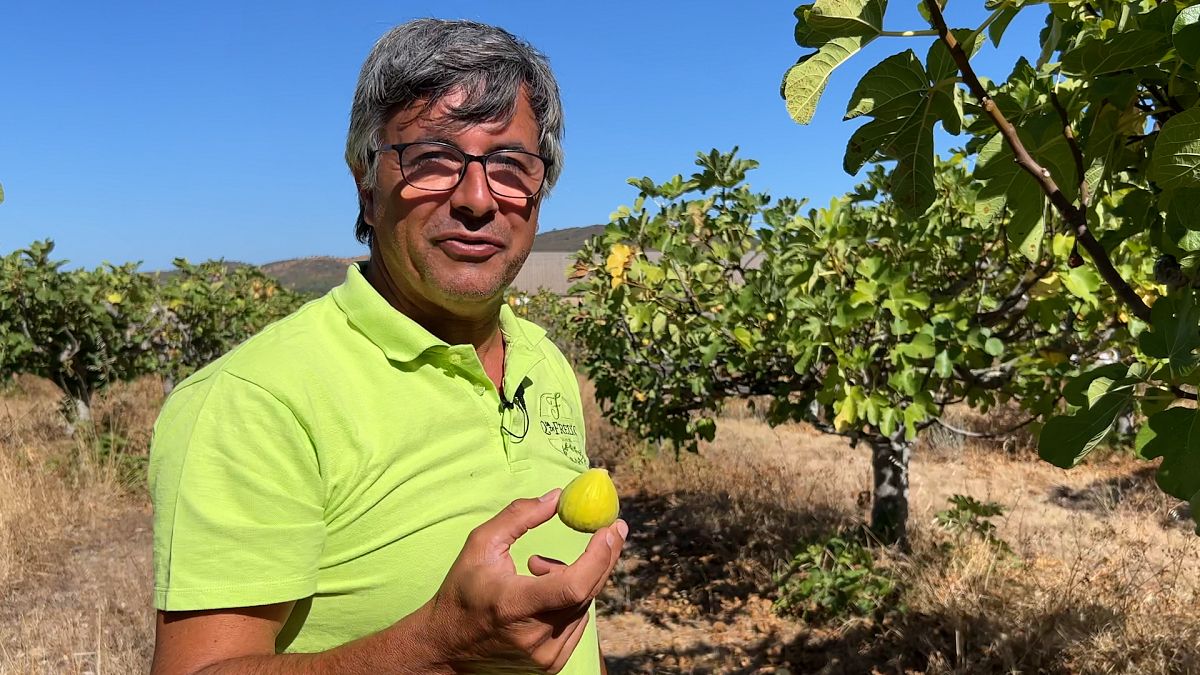In the Algarve, a region of southern Portugal regularly hit by drought, farmers are showing the way towards rational consumption of the water they have to share with millions of tourists.
After a severe drought hit the region a few months ago, the Portuguese government threatened farmers in the Algarve with severe water restrictions, provoking a major outcry. The cuts, of up to 70%, were not implemented.
“The truth is that we already have to live with restrictions. Some say we’ll run out of water in the future. But there’s already no more water here,” says Jorge Pascoa, oenologist at Quinta do Canhoto, a vineyard specialising in wine tourism in the hills above Albufeira, a seaside resort that has become one of Europe’s main touristic hotspots.
Although organised visits and tastings have been a success, the drop in rainfall in recent years has limited the volume of wine produced. After the harvest at the end of August, an empty vat testifies to this harsh reality. ”The quality is good, but the quantity isn’t,” laments Pascoa.
Using less and better water
“The lack of water has pushed us to invest in innovative irrigation systems,”explains Edgar Vilarinho, the co-owner the Quinta do Canhoto winery, that includes 11 hectares of vineyards irrigated thanks to the traditional family well, and a large space dedicated to winemaking, tastings and events.
These solutions include sensors that measure humidity levels at different depths beneath the vines in real time, with the aim to water only when necessary. ”At the end of the campaign, we will have saved water and improved the quality of the fruit, and therefore the wine,” Pascoa says.
The company has also opted for an underground irrigation system that waters the roots of the vines directly. Edgar Vilarinho claims that this system allows him to water his vines once a week, compared with eight times previously. ”For the moment, we’re very satisfied with this solution, we’ll see what happens next,” he says.
This technology, developed in the United States, is designed to reduce evaporation and competition from other plants. ”In the long term, we could save up to 30% on water by using it less and better,” confirms Jorge.
The winegrowers are supported by the Portuguese association Smart Farm Colab, which campaigns for the democratisation of digital solutions on farms. The association is partly funded by the Portuguese government and the European Union.
“Our aim is to work with the technicians who are out in the fields all day long to adapt needs to technology as effectively as possible. Technology doesn’t make decisions, it supports them,” explains Catia Pinto, Executive Director of Smart Farm CoLab.
“It didn’t rain at all in August, and hardly at all in July. Here, every drop counts, because we mustn’t forget that we are competing with other industries such as tourism,” says Pinto, while showing data from the weather station installed in the vineyards.
The Algarve, which includes some of Portugal’s most beautiful beaches, is the country’s main tourist region. Last year it welcomed more than five million visitors. It is also a famous golfing destination with almost 40 courses.
The Algarve is also an important agricultural region. In recent years, it has turned to citrus crops, such as oranges, and avocados, which are particularly demanding in terms of water resources.
“These crops force us to find solutions, such as creating reservoirs and looking for water at greater depths, but they are often a Pandora’s box. We solve this problem, but create others for later,” explains Luis Silva, the owner of Quinta do Freixo, a farm located a 20-minute drive from Albufeira, a mecca of ecotourism in the Algarve.
Turn the soil into a sponge
After several decades of organic farming, Luis Silva now advocates ‘holistic management’ of his estate, and applies techniques based on the complementary ecosystem services provided by plants and animals.
1,200 sheep graze his lands on a short rotation system to mimic the wild state. The animals stir up the soil, adding organic matter that helps the plants to grow better and the soil to absorb water more effectively, according to Silva.
“At the peak of summer, the soil can reach temperatures of 60 degrees. No life can survive in those conditions, so it’s really important to keep the soil covered. If the soil is bare, then the water slides off it,” explains the farmer as he scrapes away rock-hard earth in a place where the animals have not yet been.
“The animals are helping to create a soil that will behave like a sponge,” adds Silva, who has taken part in several university research projects linked to regenerative agriculture.
The economic viability of Quinta do Freixo is based on tourism. Visitors can enjoy the estate’s wooded valleys and water reservoirs, which are threaded with hiking and cycling trails.
Luis Silva is adamant that he does not follow the economic pull of international markets. The vast majority of the fruit and vegetables produced are sold in the farm shop and used in the restaurant, which generates a healthy profit margin, according to Luis Silva.
“Natural capital is also an important component for us. We see soil regeneration as a profit. If we had no wildlife, or only one crop, our tourism potential wouldn’t be the same,” he says.
Estimates show that over 60% of European soils are unhealthy and soil degradation has already cost billions of euros due to the loss of essential services they provide, according to the EU. A proposed EU Soil Monitoring Law should soon help to identify appropriate practices by providing precise data on soil parameters.

